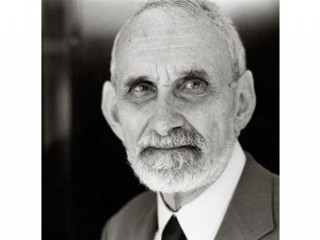
Robert F. Curl Jr. biography
Date of birth : 1933-08-23
Date of death : -
Birthplace : Alice, Texas, United States
Nationality : American
Category : Science and Technology
Last modified : 2011-09-22
Credited as : chemist, C60, Nobel prize for chemistry
0 votes so far
Born in Alice, Texas, United States, Curl received a B.A. from Rice Institute in 1954 and a Ph.D. in chemistry from the University of California, Berkeley, in 1957. Professor Curl's current research interests involve physical chemistry, developing DNA genotyping and sequencing instrumentation, and creating quantum cascade laser-based mid-infrared trace gas monitoring instrumentation. Curl often attended the German table at Hanszen College at Rice University. However, he is more known in the residential college life at Rice University for being the first master of Lovett College.
Buckminsterfullerene -whimsically abbreviated to "buckyball"- proved to be the first of several similar forms of carbon collectively dubbed fullerenes. Since the discovery of fullerenes, research on these compounds has accelerated. Although Kroto, Curl, and Smalley discovered this fundamental new form of carbon as a synthetic product in the course of attempting to simulate the chemistry in the atmosphere of giant stars, fullerenes were later found to occur naturally in tiny amounts on Earth and in meteorites. In the 1990s a method was announced for producing buckyballs in large quantities, and practical applications appeared likely. In 1991 Science magazine named buckminsterfullerene their "molecule of the year."
Curl's later research focused on quartz tuning forks and the development of trace-gas sensors. This research was aimed at creating sensors that could be used to generate arrays of quartz tuning forks. These arrays could then be used for the photoacoustic detection of gases. He also worked on developing improved technology that employed high-powered lasers and fluorescent dyes to sequence DNA.
Awards and honors:
IME James Clayton Prize 1957 (with Kenneth S. Pitzer)
EGU Alexander von Humboldt Medal 1972
APS International Prize for New Materials Research 1992 (with Harold Kroto and R. E. Smalley)
Nobel Prize for Chemistry 1996 (with Sir Harold Kroto and Richard E. Smalley)
Alfred P. Sloan Foundation Fellowship
American Academy of Arts and Sciences
European Academy of Arts, Sciences, and Humanities
National Research Council of Canada
National Academy of Sciences
National Science Foundation Fellowship
Optical Society of America
Royal Society of New Zealand Foreign Member
National Institute of Standards and Technology
Phi Beta Kappa Society
Phi Lambda Upsilon Chemistry Honor Society
Sigma Xi Scientific Research Society
Democratic National Committee
John Kerry for President
















